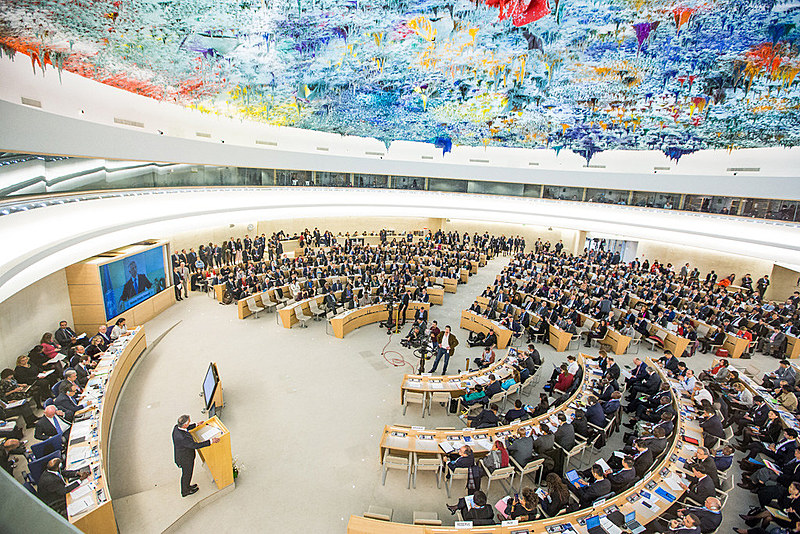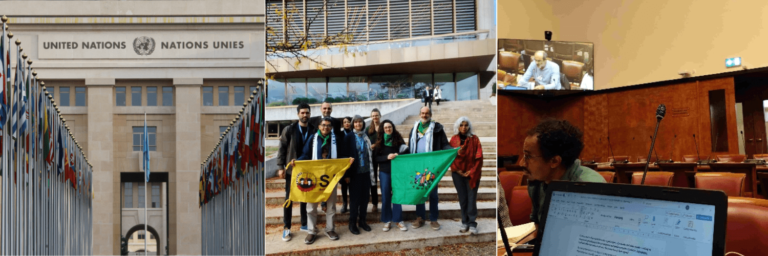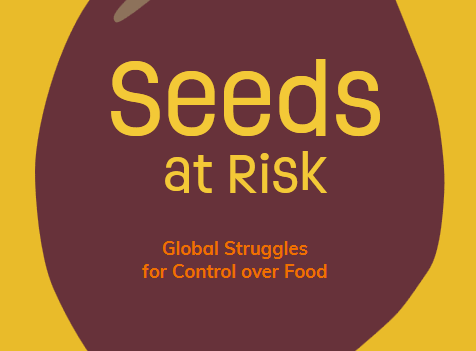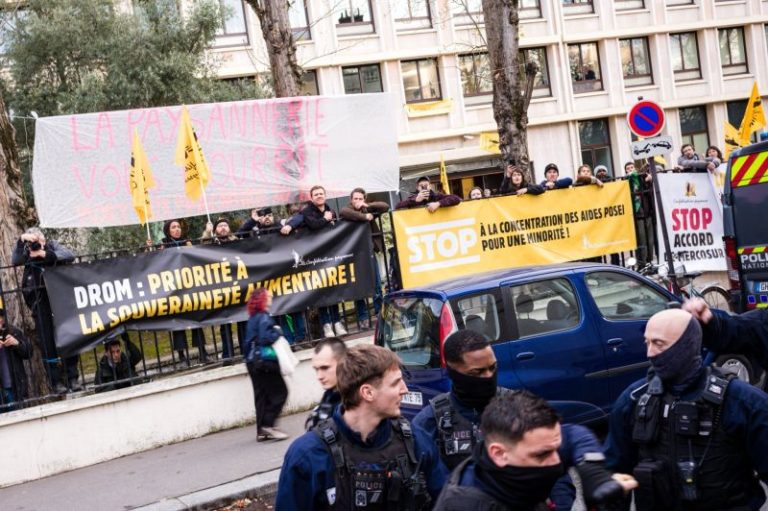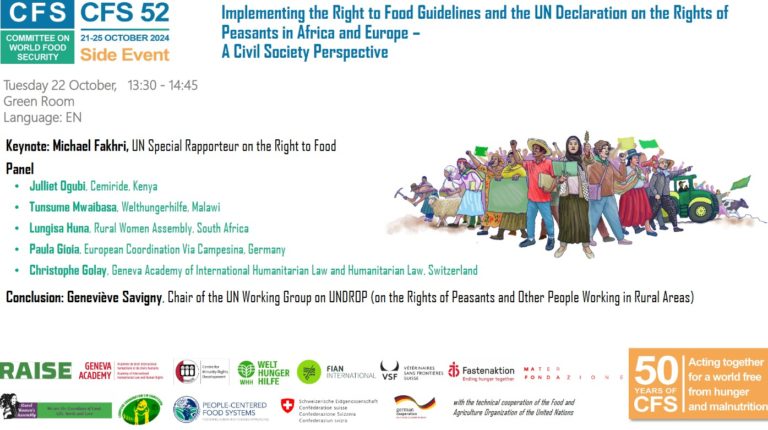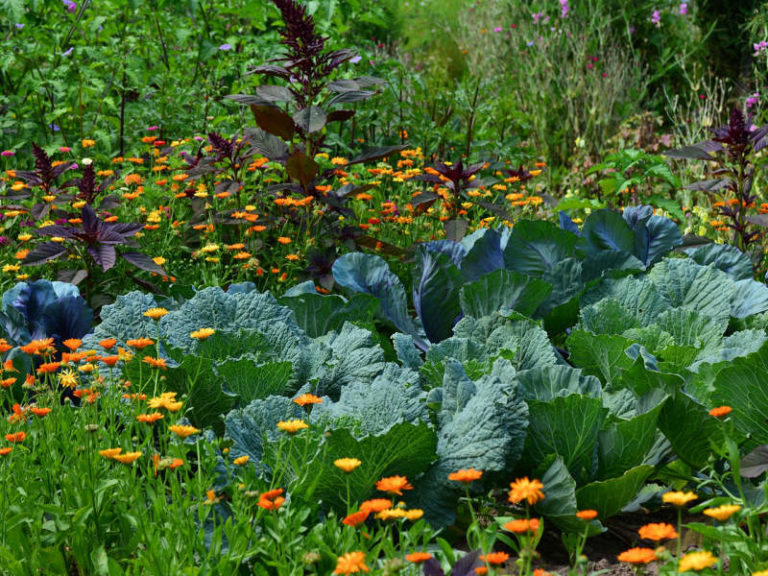Dossier: Activities surrounding the first report of the UNDROP Working Group
In September 2024, the UN Working Group on UNDROP presented its first annual report to the Human Rights Council. The presentation of this first official report was an opportunity for La Via Campesina and allied organizations to take part in discussions at international level. La Via Campesina was able to position itself as a constant interlocutor on peasants’ rights and a supporter of the Working Group.
On this page we have compiled all the information concerning this first report: the report itself, the written commentary from civil society, but also a summary of the presentation of the report, with interventions by members of La Via Campesina and the recording of a side-event organized around UNDROP.
A new step forward: The vision report of the UN Working Group on UNDROP presented at the UN
During the 57th session of the Human Rights Council, on September 19th, 2024, the newly appointed UN Working Group on UNDROP – represented by Geneviève Savigny, former peasant and now Chair of the Working Group – presented its first report to the Human Rights Council in Geneva. If the first two parts of the report are dedicated to the context of their mandate and the history of the recognition of the UNDROP, the last parts are a first view of how the group understands its mandate and will carry it out.
According to this report, the Working Group fully recognizes peasants and rural workers’ role in the elaboration of the UNDROP and intends to keep them as the main actors in the implementation of their rights. The report addresses as well key substantive issues, as the definition of peasants and other people working in rural areas (as per article 1 of the Declaration) and the structural and systematic discrimination that they are facing in the context of a dominant economic architecture that generates exclusion and dispossession.
Read the report here:
The interactive dialogue with the Working Group in the Human Rights Council plenary session
On September 19th, 2024, The UN Working Group on UNDROP held its first interactive dialogue, during which Genevieve Savigny presented the first report of the Working Group. She stated that her election as Chair was a “strong signal” as it is the first time that a peasant woman holds such a position in the UN system.
She recalled that the mandate was first and foremost the realization of the UNDROP and that the Working group will identify and promote good practices, facilitate and contribute to the exchange of technical assistance, collaborate strongly with other UN agencies, States, rights-holders (peasants and other people working in rural areas) and civil society organizations.
She emphasized the importance of the UNDROP for the protection and realization of peasants’ rights as the only international norm encompassing peasants’ rights and defining them. She asked States to share with the Working group the actions taken to promote the UNDROP, she encouraged them to allocate resources for this aim, to translate the Declaration, and to elaborate training programs for civil servants and civil society, among other actions.
The Working Group already launched a call for inputs to identify the priority issues on which it will be working over the next two years. The Working Group will hold 3 sessions of 5 days per year -2 in Geneva and 1 in New York.
Overall, the majority of States welcomed the 1st report of the Working Group.
States such as Bolivia, Cuba, Luxembourg, Colombia, and other countries sensitive to the issue, recalled that UNDROP is a key instrument to protect peasants’ rights. They wished every success for the members of the new Working Group, assured them of their support and shared the hope that the Working Group will be a space for joint action, and more engagement from States and others stakeholders.
States shared the actions taken to promote and realize the rights of peasants, for instance :
Brazil is currently in the process of translating the UNDROP into portuguese ; Colombia recognized in July through a legislative act, peasants as subject of law ; Algeria took measures to compensate peasants facing droughts and shortages as well as steps to support rural women’s entrepreneurship ; Ivory Coast, Burkina Faso and Togo, created and increased their policies and programs to support peasants’ work and livelihood ; Malaysia launched a campaign promoting organic farming practices ; Vietnam organized land reforms and the promotion of sustainable agriculture, and assured the Working Group of its commitment to the implementation of UNDROP.
See the videos of the presentation of the report and of the interactive dialogue here:
- http://webtv.un.org/en/asset/k1p/k1pdvaevd2 (starts at 02:06)
- http://webtv.un.org/en/asset/k19/k1938xb443
La Via Campesina and its allies at the forefront of the discussions
Prior to the publication of the report of the UN Working Group on UNDROP, CETIM, FIAN International and La Via Campesina submitted a written statement to the Human Rights Council.
The statement :
- puts into context the adoption of the Declaration and the creation of the Working Group,
- explains that the implementation of the rights of peasants and rural workers must remain at the heart of the process
- recalls that peasants’ and rural organizations have been strongly advocating for the creation of the Working Group,
- supports the Working Group and its future work,
- proposes priority areas of work for the Working Group such as the collection and dissemination of best practices, technical support and monitoring of the implementation of the Declaration rights at the heart of peasants’ and rural workers’ struggles.
Read the statement here : https://defendingpeasantsrights.org/wp-content/uploads/2024/09/Writen_Statement_UNDROP_offic-ENG.pdf
Two members of La Via Campesina made oral statements during the interactive dialogue with the Working Group in the plenary session:
Diego Monton from La Via Campesina, speaking on behalf of CETIM, presented the main challenges for the Working Group to address: building bridges with the rights holders and States in order to accelerate the implementation; dismantling of the transnational financial architecture that imposes dominant trade and investment regimes that directly threaten the rights of peasants; accompanying States in the process of implementation, by sharing good practices; and identifying the main obstacles to the proper respect of peasant rights.
Watch the full statement here: https://www.youtube.com/watch?v=Ep8lw9iyFJc
Moayyad Bsharat from La Via Campesina, speaking on behalf of FIAN International, welcomed the first report of the Working Group on the Rights of Peasants and other People Working in Rural Areas. He highlighted the devastating impacts the Israeli occupation and settler violence have on peasants, pastoralists, fishers, and rural communities. Agricultural fields and food systems have been destroyed not only in Gaza, also in the West Bank, the system of colonial oppression restricts peasants’ rights to access their agricultural lands. He called on all States to end the war, the starvation and the occupation – a precondition for fulfilling the Palestinian people’s right to self-determination, their right to food sovereignty, and all other rights enshrined in UNDROP.
Watch the full statement here: https://www.youtube.com/watch?v=FLIxZ1Us4O8
A joint side-event: Rights holders, CSOs, States and UN mechanisms united for the peasants’ rights cause
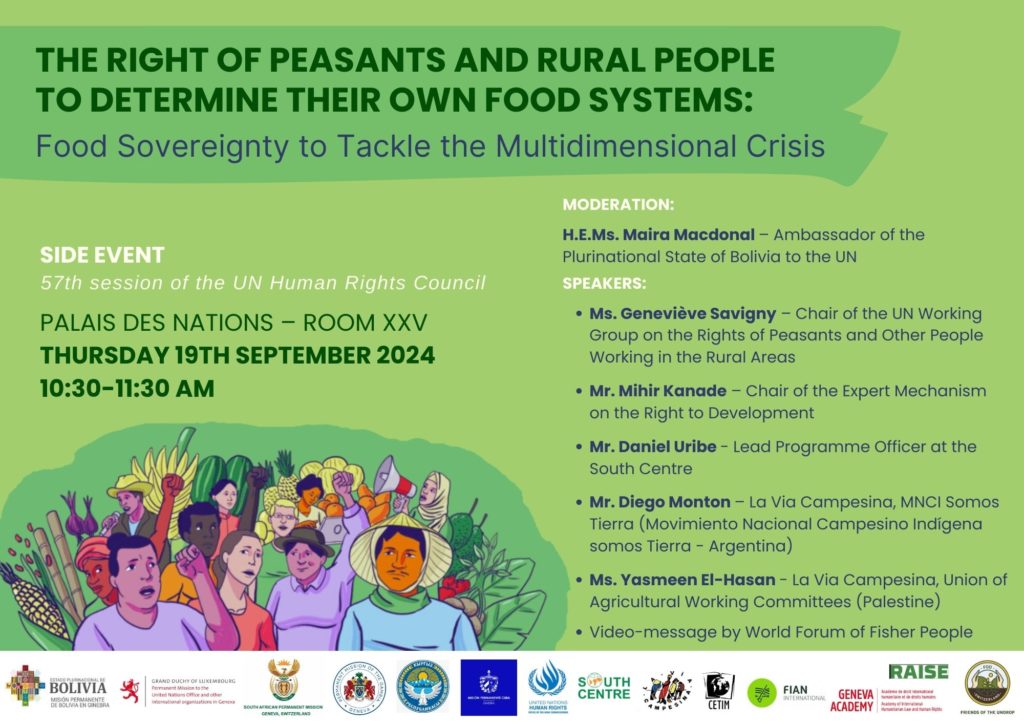
At the occasion of the presentation of the report, La Via Campesina, CETIM and FIAN International co-organized a side event entitled “The Right of Peasants and Rural People to Determine Their Own Food Systems: Food Sovereignty to Tackle the Multidimensional Crisis”. The panel of speakers, moderated by Maira Macdonal, Ambassador of the Plurinational State of Bolivia to the UN, included Geneviève Savigny, Chair of the UN Working Group on UNDROP; Mihir Kanade, Chair of the Expert Mechanism on the Right to Development; Daniel Uribe, Lead Programme Officer of the Sustainable Development and Climate Change (SDCC) Programme of the South Centre ; Diego Monton, La Via Campesina, MNCI Somos Tierra Argentina; Yasmeen El-Hasan, La Via Campesina, Union of Agricultural Working Committees (Palestine); and Herman Kumara, General Secretary of the World Forum of Fisher Peoples.
The side event discussed the UNDROP as a major normative advancement not only in protecting the rights of rural communities and workers to live and work in dignity but also in empowering peasants, rural workers, fishers, pastoralists, nomadic people, hunter-gatherers, Indigenous Peoples working in the rural areas, rural women, migrant workers and landless communities. Speakers welcomed the creation of the UN Working Group and expressed their expectations and commitment to collaborate with it.
The importance of the right to food sovereignty to tackle multiple crises and the key role peasants, fisher people and rural communities around the globe play has been highlighted. The panel specifically touched on the importance of active participation when it comes to achieving food sovereignty for peasants, rural workers, and Indigenous Peoples. Peasants must be able to define what development looks like for them in realizing their right to development and must be enabled to actively participate in decision-making processes that will impact their communities and livelihoods. This right to participation is specifically enshrined in Articles 2 and 10 of UNDROP. In the face of threats such as large agribusiness powers dispossessing peasants and rural workers of their land, the exploitation of natural resources to maximize profits primarily at the expense of peasants and rural workers, and war and settler colonialism violently severing the connection of Indigenous Peoples to their land, the panelists emphasized the human rights to development, food, water, and self-determination, as well as agroecology, as pathways to the full realization of food sovereignty and the principles of UNDROP.
Watch the side-event here: https://www.youtube.com/watch?v=4TA4MpLRy5Q

